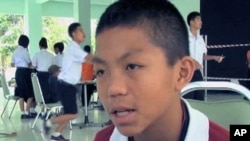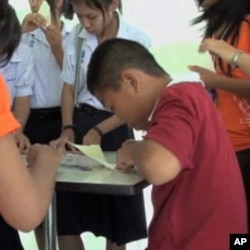In Thailand, children of migrant workers, most of them from Burma, can get caught in a legal limbo that leaves them stateless, unrecognized as citizens of any country. There are thousands of stateless children with limited access to education and health care, and with limited freedom of movement.
Thailand denies Burmese boy a passport
The problem of stateless children was highlighted when 12-year-old Mong Thongdee Thailand's national paper airplane champion, was invited last year to an international competition in Japan.
Although he was born in Thailand, the ethnic Shan boy was refused a passport because his parents are migrant workers who fled conflict in Burma.
Scenes of him crying on national television stole the hearts of ordinary Thai people.
Temporary travel documents granted
Prime Minister Abhisit Vejjajiva intervened to get Mong a temporary travel document. In Japan he won a bronze medal and his team won gold for the country that, despite his status, he calls home.
More than a year later, Mong remains a minor celebrity. Invited to a university to demonstrate his paper airplane folding skills, he is swarmed by young girls wanting his autograph.
He says he wants to study really well. If he has a chance, he says, he wants to do something for Thailand. He says perhaps he can help improve Thailand's reputation.
Mong wants to be a pilot and his fame has allowed him and his classmates the opportunity to compete in a radio controlled airplane contest.
Thailand migrants a 'national security concern'
But he still needs official permission to leave his home town because Thai authorities consider stateless migrants, even children, to be a national security concern.
Duangrit Ketima, director of Bann Hway Sai, Mong's school, in Chiang Mai says more than half of his 80 students are stateless but they should not be labeled a burden.
He says the children are probably no threat to Thailand and even make contributions to the country. So, he says, the government should consider giving them citizenship.
Many children migrate with their families illegally to escape conflict and poverty, making it hard for them to claim citizenship in Burma.
They work on construction sites and farms in but they can not register with authorities. Their status leaves them vulnerable to exploitation and unable to access social welfare programs.
Although Thailand mandates education for all children, regardless of their status, many do not speak enough Thai to keep up in class or their parents do not send them to school for fear they could be deported.
Hsai Leng directs the Migrant Learning Center in Chiang Mai, a charity funded by an American businessman, where migrants can get free education and community support.
"They cannot go to Thai school; they cannot go to [get] the, maybe, health care," Hsai said. "And, sometime, if you have no document you can have no job, you cannot work."
Thailand citizenship, then and now
Before 1972 Thailand granted citizenship to everyone born in the country.
But an influx of refugees and migrants because of conflicts in the region led to a change in law, requiring that the children of non-Thai nationals apply for citizenship.
Senator Tuang Untachai says Thailand should not be expected to pay for the welfare of migrant children.
He says if they give citizenship to a lot of people then more will migrate from neighboring countries into Thailand. He says they are one of the target countries for migrants so, if the policy is not clear, a lot of people will migrate here because when they come to Thailand they can get fundamental rights to education, medical treatment, and other services just like Thai people.
At a beauty parlor in Chiang Mai an ethnic Shan woman is scrubbing a customer's foot for a pedicure. She lives with her daughter and mother in a one-bedroom apartment and does not wish to be identified because not all of them are here legally.
She says she came to Thailand to work and send money back home. Burma was expensive and they wanted to be together so she brought her family to Thailand. But, she says she does not dare enroll her daughter in a Thai school because she does not think she could follow the classes. Also, she does not think she could afford the school fees.
For now the mother sends her daughter to the migrant learning center.
She wants her daughter to study hard and eventually become a Thai citizen so she will have more opportunities and not have to go back to Burma where fighting and poverty are all too common.





